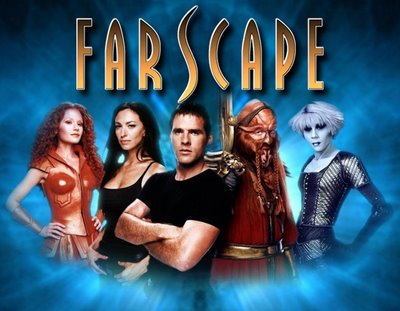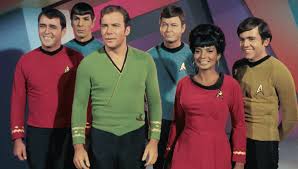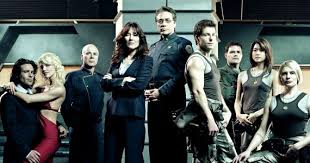Full disclosure: I am a huge nerd about many things. One of the things is sci-fi shows about a small group of people who live together on a spaceship in the future, and another of the things is linguistics and the evolution of the English language from Anglo-Saxon to present day. Different sci-fi shows take different approaches to the question of what will happen to English several hundred/thousand years in the future--but which approach is the most effective?
1.The Farscape Approach

Stark: Friend or foe, friend or foe, friend or foe …
Rygel: Will you shut the frell up! … Of course it’s a foe, we have no friends!
Farscape, like Doctor Who and Hitchhiker’s Guide, solves the language problem with science. Once injected with translator microbes, you hear everyone speaking in your native tongue, so it would make sense that everyone speaks like Crichton, who is a human from Earth in the very near future.
However, everyone in Farscape does NOT speak like Crichton, which is mystifying. Why are some species translated by the microbes as British? And why in heaven’s name have the translator microbes translated all swear words as “frell”? Were Crichton’s microbes set to PG mode? The world will never know.
2.The Star Trek Approach

Spock: "Random chance seems to have operated in our favor."
McCoy: "In plain, non-Vulcan English, we've been lucky."
Spock: "I believe I said that, Doctor."
There are a lot of different dialects of English spoken in Star Trek, but all of them correspond to ways of speaking currently found on Earth, despite being set in the distant future. Spock speaks in academic, purple English, McCoy has kind of a cowboy thing going, Scotty is Scottish, Kirk is annoying. Earth is united under a single government, but regional dialects and languages seem to persist, as indicated by the fact that Chekov’s first language is Russian. With so many different cultures and languages thrown together, you would expect a starfleet dialect to spring up, or at the very least some slang, but there really isn’t any. In some ways, the Star Trek approach actually works: it creates a suspension of disbelief in which you don’t think about or notice the language, because it is all familiar to you. Unless you’re me, in which case you spend the whole time wondering why they all speak like they live in the 20th century.
3.The Battlestar Galactica Approach

Starbuck: Why can’t we use the starboard launch?
Tyrol: It’s a gift shop now.
Starbuck: Frak me.
Like Star Trek, everyone speaks ordinary English, but all swear words have been replaced by “frak.” I don’t think this had the effect they were hoping for, and I do not recommend this approach. The characters would yell “frak!” in highly emotional moments, and I would burst out in unfortunate laughter.
The problem here I think is that they didn’t go all in. If you’re going to make up new slang for your future English, you need more of it, and other things about the language need to have evolved as well. Otherwise, instead of being immersive and cool, it just breaks the suspension of disbelief completely.
4.The Firefly Approach

Mal: In case you hadn't noticed, her voice kinda carries. We're two miles above ground and they can probably hear her down there. Soon as we unload, she can holler until our ears bleed. Although I would take it as a kindness if she didn't.
River: The human body can be drained of blood in 8.6 seconds given adequate vacuuming systems.
Mal: See, morbid and creepifying, I got no problem with, long as she does it quiet-like.
Oh, Firefly. You tried the hardest, which goes to show that if you go big, you end up making some interesting mistakes. In a future world where American and Chinese culture dominate, everyone speaks in a combination of country western with Chinese swear words and some made up slang. It’s got its own distinct rhythm and it’s fun to listen to them talk, but there are some problems with this approach, and it’s not just the cultural appropriation and the fact that none of the characters are actually Chinese. No: when two languages are combined, this isn’t what it sounds like. There’s no evidence of Chinese influence in word order, verb conjugations, pronoun use, or even most of their vocabulary.
For comparison, here’s a video of characters from Frozen speaking Singlish, a language that is a combination of Mandarin, English, and Tamil, spoken in Singapore:
SO COOL, right?
Ok, you might be thinking, of course they can’t speak like that in Firefly, because then audiences wouldn’t understand them. This is true. And this brings up another point: what is the purpose of creating a futuristic version of English in your show? Done right, it creates a sense of a cohesive world, one that is distinctly different from yours. One of the things that works well about Firefly’s dialect is that they never translate the slang and Chinese that they do use, so most audiences are in the dark about what they’ve said (though usually it’s pretty clear from context). Watching people talk when you can’t understand every word they’re saying has a distancing effect; it’s a constant reminder that it’s an alien world, and you’re an outside observer. On the other hand, once you start to learn the slang, it can be even more immersive. It creates an “in” group of people who know the slang; witness the number of people still going around using “gorram” and “shiny” in their daily conversations IRL.
Of all these different approaches, Firefly’s approach seems to have been the most influential when it comes to tv shows (Sci-Fi movies on the other hand almost always take the Star Trek approach of doing nothing, though Pacific Rim had a touch of in-universe slang). SyFy’s current shipboard shows, Killjoys and Dark Matter, have both gone for a Firefly-lite approach; the characters have a distinctive pattern of sentence construction and a sprinkling of universe-specific vocabulary (Dark Matter even uses some of Firefly’s slang), but not nearly on the same scale, and neither has attempted any kind of language blending with non-English languages.
I would love to see a show that took the dual-language approach but really WENT for it, got bilingual speakers of both languages to write the dialogue and act, created a future world that wasn’t based on American culture (or American culture with bits of other cultures thrown in for “flavor”). You’d need subtitles for sure, but I would totally watch that show.